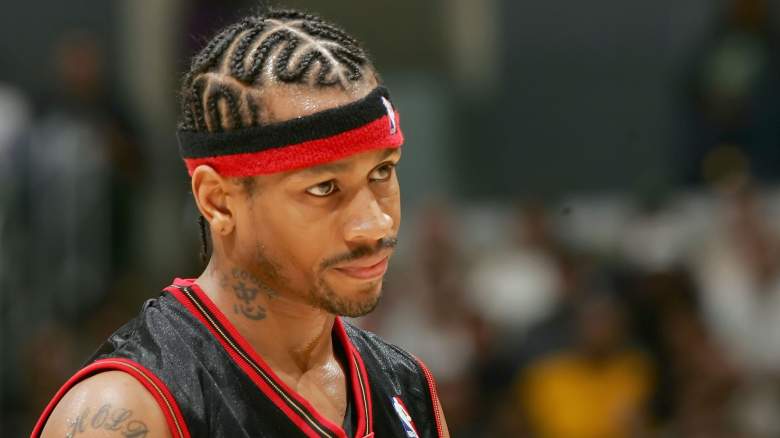
Allen Iverson or Kyrie Irving? “The Answer” vs. “Uncle Drew”.
The question of whether or not Irving has, at this point in his career, surpassed the Philadelphia 76ers legend was posed by a Washington, DC-based journalist earlier this week and has prompted a firestorm of wide-ranging opinions on social media.
ALL the latest Sixers news straight to your inbox! Join the Heavy on Sixers newsletter here!
According to her Twitter page, Ashley Baker is a multimedia journalist and host/producer of the “About Nothing But Sports Podcast”.
Here are some of the most entertaining reactions to Baker’s post:
And then there was this gem from Philadelphia sports radio host Glen Macnow:
Presumably, when Baker said “at this point”, she was not attempting to make the comparison of both players in 2021, but taking Irving’s career up until now and looking at it vs. Iverson’s through the same number of seasons (10). The current Brooklyn Nets point guard turned 29 on Tuesday, while the retired Iverson will turn 46 in June.
Baker is not the first person to draw comparisons between the two point guards, as Nets head coach (and one of the best point guards in NBA history) Steve Nash said in February that Irving was “more skilled.”
Robin Lundberg and Ashley Nicole Moss of Sports Illustrated debated the issue on “SI Now” as well, with Lundberg taking Irving’s side and Moss fighting for Iverson in the argument.
Do the Numbers Favor Iverson or Irving?
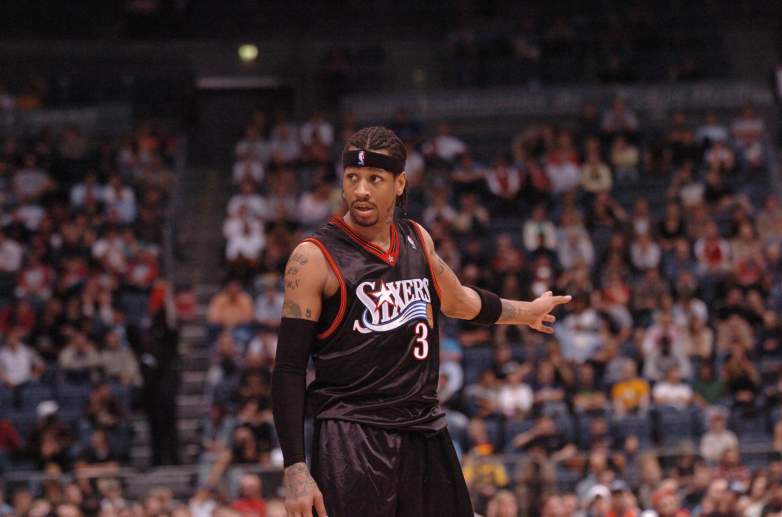
Getty ImagesAllen Iverson during a game in 2006.
Using the Stathead Player Comparison tool on Basketball Reference, the statistics may favor Irving, but not by much.
Looking at each player’s numbers per 36 minutes of action, Irving has the edge at this point in his career in field goal percentage (46.9 to 42.1), three-point percentage (39.1 to 31.0), free throw percentage (87.8 to 77.5), rebounds (4.0 to 3.4), assists (6.1 to 5.3) and is tied with Iverson at a 24.2 points average. The former Georgetown Hoya has better numbers than the former Duke Blue Devil in steals only (2.0 to 1.4.)
It’s important to take into account that when considering the comparison, Iverson had over 100 games more played than Irving, at 682 to 559. Additionally, Irving has averaged 5.9 three-point attempts per 36 minutes and Iverson was at 3.5 at this point, while “Uncle Drew” averages 4.6 free throw attempts and “AI” was coming in at a whopping 8.0.
If you expand the statistical comparisons and look the per 100 possessions numbers, Irving still maintains a lead in all shooting numbers, rebounds, and assists, but Iverson gains an advantage in points at 35.2 ton 34.0. Irving has a better offensive rating per 100 possessions (114 to 104), but Iverson’s defensive rating is slightly more favorable (104 to 109).
With the more modern, advanced statistics, Irving has a better player efficiency rating (PER) at 22.4 to 21.7, but Iverson has more win shares (77.5 to 66.7).
It’s also notable to point out that although the 6-foot-2-inch Irving is smaller than some other modern-day point guards (i.e. 6-foot-11-inch Ben Simmons), Iverson was truly one-of-a-kind at 6 feet even and 165 pounds.
Comparing Iverson and Irving’s Playoff Numbers, Supporting Cast, and Accolades
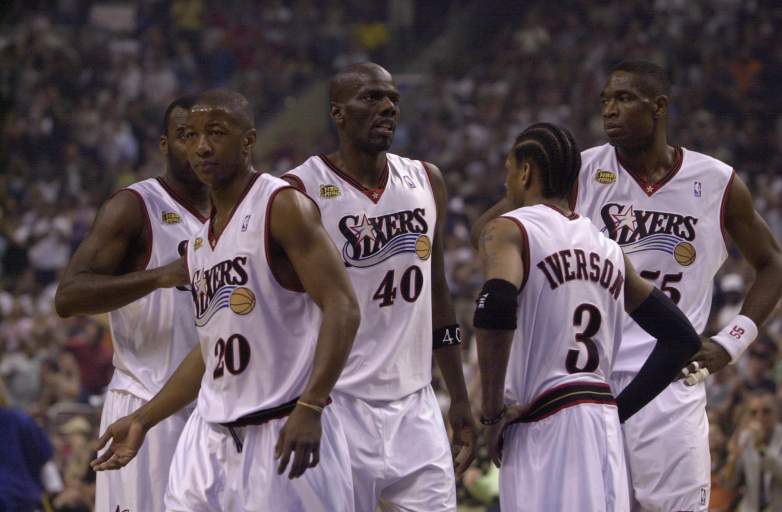
Ezra O. Shaw/AllsportThe Philadelphia 76ers during the 2001 NBA Finals against the Los Angeles Lakers.
After spending the first six seasons of his career with the Cleveland Cavaliers, Irving is now with his third team, after spending two campaigns with the Boston Celtics and now two with the Nets. Iverson meanwhile spent the first 10 years of his NBA journey in Philadelphia, before spending parts of in Denver, one in Detroit, and one in Memphis, before returning to the Sixers for the last 25 games of his career.
Remarkably, at this point, Irving has played just one fewer playoff game than Iverson did through his 10th season (61 to 62). The former’s shooting numbers per 36 minutes in the playoffs are still better across the board, but the additional statistics are very close.
Irving leads in assists (5.0 to 4.8), but Iverson has a slim lead in rebounds (3.3 to 3.2), steals (1.7 to 1.4), and points (24.2 to 23.3). Once again, the advanced numbers are nearly identical, with Iverson holding an advantage in PER (22.0 to 21.4), but Irving have the upper hand in win shares (7.8 to 7.0.)
When Iverson became eligible for the Basketball Hall of Fame in 2016, it was obvious that he would be a first-ballot no-brainer. Based on how Irving’s career has gone thus far, it was be a stunner if he did not get enshrined into the Springfield, Massachusetts locale someday as well.
Through 10 NBA seasons, Iverson was a seven-time All-Star, 1997 Rookie of the Year, one-time Most Valuable Player and four-time scoring champion. Irving currently has seven All-Star nods to his credit, a 2012 Rookie of the Year award, and a NBA Championship title (where he hit the game-winning shot in the decisive game no less).
Though it’s certainly a debatable topic of Kyrie Irving vs. Allen Iverson, one argument that can’t be questioned is who had the better supporting cast? When you look at the likes LeBron James and Kevin Love, and now Kevin Durant and James Harden, and compare them with a mid-30’s Dikembe Mutombo, Aaron McKie, Eric Snow, and Tyrone Hill, it’s obvious that Irving has had significantly better help.
That comparison spurs no question of “Who ya got?”
READ NEXT: Have Sixers Injuries Made Doc Rivers an Award ‘Favorite’?
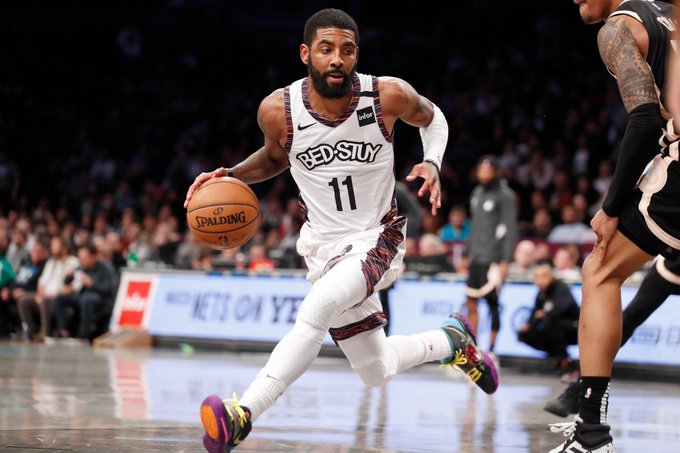
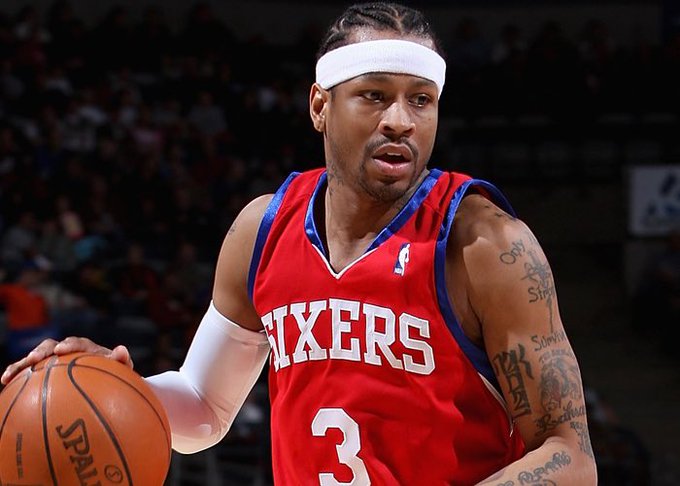
Comments
Allen Iverson, Kyrie Irving Comparison Sparks Twitter Firestorm